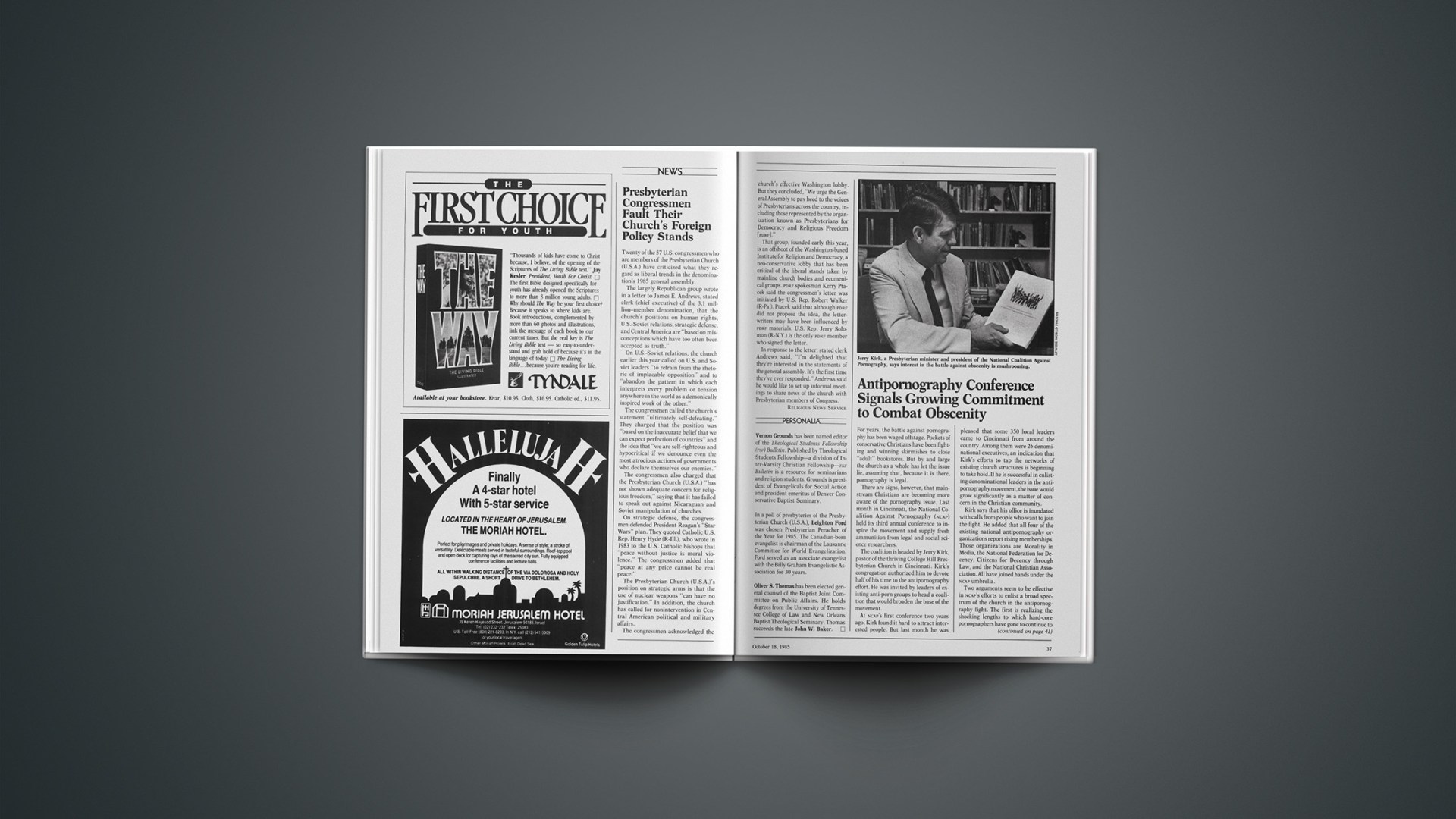Twenty of the 57 U.S. congressmen who are members of the Presbyterian Church (U.S.A.) have criticized what they regard as liberal trends in the denomination’s 1985 general assembly.
The largely Republican group wrote in a letter to James E. Andrews, stated clerk (chief executive) of the 3.1 million-member denomination, that the church’s positions on human rights, U.S.-Soviet relations, strategic defense, and Central America are “based on misconceptions which have too often been accepted as truth.”
On U.S.-Soviet relations, the church earlier this year called on U.S. and Soviet leaders “to refrain from the rhetoric of implacable opposition” and to “abandon the pattern in which each interprets every problem or tension anywhere in the world as a demonically inspired work of the other.”
The congressmen called the church’s statement “ultimately self-defeating.” They charged that the position was “based on the inaccurate belief that we can expect perfection of countries” and the idea that “we are self-righteous and hypocritical if we denounce even the most atrocious actions of governments who declare themselves our enemies.”
The congressmen also charged that the Presbyterian Church (U.S.A.) “has not shown adequate concern for religious freedom,” saying that it has failed to speak out against Nicaraguan and Soviet manipulation of churches.
On strategic defense, the congressmen defended President Reagan’s “Star Wars” plan. They quoted Catholic U.S. Rep. Henry Hyde (R-Ill.), who wrote in 1983 to the U.S. Catholic bishops that “peace without justice is moral violence.” The congressmen added that “peace at any price cannot be real peace.”
The Presbyterian Church (U.S.A.)’s position on strategic arms is that the use of nuclear weapons “can have no justification.” In addition, the church has called for nonintervention in Central American political and military affairs.
The congressmen acknowledged the church’s effective Washington lobby. But they concluded, “We urge the General Assembly to pay heed to the voices of Presbyterians across the country, including those represented by the organization known as Presbyterians for Democracy and Religious Freedom [PDRF].”
That group, founded early this year, is an offshoot of the Washington-based Institute for Religion and Democracy, a neo-conservative lobby that has been critical of the liberal stands taken by mainline church bodies and ecumenical groups. PDRF spokesman Kerry Ptacek said the congressmen’s letter was initiated by U.S. Rep. Robert Walker (R-Pa.). Ptacek said that although PDRF did not propose the idea, the letter-writers may have been influenced by PDRF materials. U.S. Rep. Jerry Solomon (R-N.Y.) is the only PDRF member who signed the letter.
In response to the letter, stated clerk Andrews said, “I’m delighted that they’re interested in the statements of the general assembly. It’s the first time they’ve ever responded.” Andrews said he would like to set up informal meetings to share news of the church with Presbyterian members of Congress.
Personalia
Vernon Grounds has been named editor of the Theological Students Fellowship (TSF) Bulletin. Published by Theological Students Fellowship—a division of Inter-Varsity Christian Fellowship—TSF Bulletin is a resource for seminarians and religion students. Grounds is president of Evangelicals for Social Action and president emeritus of Denver Conservative Baptist Seminary.
In a poll of presbyteries of the Presbyterian Church (U.S.A.), Leighton Ford was chosen Presbyterian Preacher of the Year for 1985. The Canadian-born evangelist is chairman of the Lausanne Committee for World Evangelization. Ford served as an associate evangelist with the Billy Graham Evangelistic Association for 30 years.
Oliver S. Thomas has been elected general counsel of the Baptist Joint Committee on Public Affairs. He holds degrees from the University of Tennessee College of Law and New Orleans Baptist Theological Seminary. Thomas succeeds the late John W. Baker.










